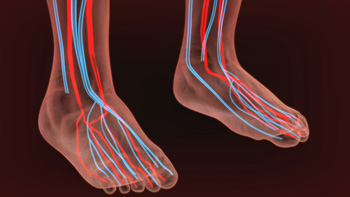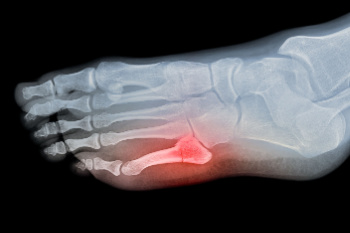Items filtered by date: October 2024
Recognizing Symptoms of Poor Foot Circulation

Poor foot circulation can lead to a range of concerning symptoms that may significantly impact your daily life. Common indicators include numbness, tingling, or a cold sensation in the feet. Individuals may also experience cramping, especially during physical activity, and slow-healing wounds or ulcers. Several underlying causes can contribute to poor circulation, including varicose veins, peripheral artery disease, atherosclerosis, and blood clots. Varicose veins can impede blood flow due to weakened valves, while peripheral artery disease restricts blood supply to the extremities. Atherosclerosis, caused by a buildup of fatty deposits in arteries, can further diminish circulation. Blood clots can obstruct blood flow entirely, causing severe complications. If your feet are affected by poor circulation, it is suggested that you consult a podiatrist for a comprehensive treatment plan.
While poor circulation itself isn’t a condition; it is a symptom of another underlying health condition you may have. If you have any concerns with poor circulation in your feet contact one of our podiatrists of Foot Care Centers of Palm Beach. Our doctors will treat your foot and ankle needs.
Poor Circulation in the Feet
Peripheral artery disease (PAD) can potentially lead to poor circulation in the lower extremities. PAD is a condition that causes the blood vessels and arteries to narrow. In a linked condition called atherosclerosis, the arteries stiffen up due to a buildup of plaque in the arteries and blood vessels. These two conditions can cause a decrease in the amount of blood that flows to your extremities, therefore resulting in pain.
Symptoms
Some of the most common symptoms of poor circulation are:
- Numbness
- Tingling
- Throbbing or stinging pain in limbs
- Pain
- Muscle Cramps
Treatment for poor circulation often depends on the underlying condition that causes it. Methods for treatment may include insulin for diabetes, special exercise programs, surgery for varicose veins, or compression socks for swollen legs.
As always, see a podiatrist as he or she will assist in finding a regimen that suits you. A podiatrist can also prescribe you any needed medication.
If you have any questions, please feel free to contact our office located in Boynton Beach, FL . We offer the newest diagnostic and treatment technologies for all your foot care needs.
How Foot Stress Fractures are Diagnosed

A foot stress fracture is a small, hairline crack in a bone resulting from repetitive stress or overuse, commonly occurring in athletes and active individuals. Symptoms typically include localized pain that intensifies with activity, tenderness when pressure is applied, and swelling around the affected area. Causes often involve increased physical activity, improper footwear, or sudden changes in exercise routines. Conditions like osteoporosis can also contribute to the risk of stress fractures. Diagnosing a foot stress fracture usually begins with a thorough physical examination by a podiatrist who will assess pain levels and check for tenderness. Imaging tests, such as X-rays or MRI scans, may be necessary to confirm the diagnosis and rule out other injuries. Early detection is vital for effective treatment and recovery, allowing individuals to return to their activities safely. If you have sustained a foot stress fracture, contact a podiatrist for treatment.
Activities where too much pressure is put on the feet can cause stress fractures. To learn more, contact one of our podiatrists from Foot Care Centers of Palm Beach. Our doctors can provide the care you need to keep your pain free and on your feet.
Dealing with Stress Fractures of the Foot and Ankle
Stress fractures occur in the foot and ankle when muscles in these areas weaken from too much or too little use. The feet and ankles then lose support when walking or running from the impact of the ground. Since there is no protection, the bones receive the full impact of each step. Stress on the feet can cause cracks to form in the bones, thus creating stress fractures.
What Are Stress Fractures?
Stress fractures occur frequently in individuals whose daily activities cause great impact on the feet and ankles. Stress factors are most common among:
- Runners
- People affected with Osteoporosis
- Tennis or basketball players
- Gymnasts
- High impact workouts
Symptoms
Pain from the fractures occur in the area of the fractures and can be constant or intermittent. It will often cause sharp or dull pain with swelling and tenderness. Engaging in any kind of activity which involves high impact will aggravate pain.
If you have any questions please feel free to contact our office located in Boynton Beach, FL . We offer the newest diagnostic and treatment technologies for all your foot and ankle needs.
Heel Pain Can Be Treated!
Focus on Metatarsal Shaft Fractures

Diagnosing foot fractures, particularly metatarsal shaft fractures, involves a thorough evaluation by a podiatrist. These fractures commonly result from direct trauma, overuse, or sudden twisting movements. Symptoms patients typically experience include localized pain, swelling, bruising, and difficulty bearing weight on the affected foot. A physical examination is essential for assessing tenderness and deformity. Diagnostic imaging, primarily an X-ray, is used to confirm the fracture and determine its severity. In some cases, a CT scan or MRI may be recommended for a more detailed view of the injury. Timely and accurate diagnosis is essential for appropriate treatment, which may include rest, immobilization, or in severe cases, surgery. If you have broken your foot, it is suggested that you consult a podiatrist who can determine the type of fracture and offer appropriate treatment solutions.
A broken foot requires immediate medical attention and treatment. If you need your feet checked, contact one of our podiatrists from Foot Care Centers of Palm Beach. Our doctors can provide the care you need to keep you pain-free and on your feet.
Broken Foot Causes, Symptoms, and Treatment
A broken foot is caused by one of the bones in the foot typically breaking when bended, crushed, or stretched beyond its natural capabilities. Usually the location of the fracture indicates how the break occurred, whether it was through an object, fall, or any other type of injury.
Common Symptoms of Broken Feet:
- Bruising
- Pain
- Redness
- Swelling
- Blue in color
- Numbness
- Cold
- Misshapen
- Cuts
- Deformities
Those that suspect they have a broken foot shoot seek urgent medical attention where a medical professional could diagnose the severity.
Treatment for broken bones varies depending on the cause, severity and location. Some will require the use of splints, casts or crutches while others could even involve surgery to repair the broken bones. Personal care includes the use of ice and keeping the foot stabilized and elevated.
If you have any questions please feel free to contact our office located in Boynton Beach, FL . We offer the newest diagnostic and treatment technologies for all your foot and ankle needs.
Managing Eczema on the Feet

Eczema on the feet can cause discomfort and may appear in different forms. Included are atopic dermatitis, dyshidrotic eczema, neurodermatitis, and stasis dermatitis. Symptoms of eczema on the feet can range from itchy, dry, and inflamed skin to painful blisters or thickened, discolored patches. Factors such as genetics, stress, environmental triggers, and poor circulation can contribute to the development of eczema on the feet. Managing this condition requires proper care, including moisturizing to maintain the skin barrier, wearing appropriate footwear, and avoiding potential irritants. A podiatrist can help diagnose the specific type of eczema that affects your feet and recommend treatments. They may include topical medications or other therapies to reduce inflammation and prevent infection. If you have eczema on your feet, it is suggested that you schedule an appointment with a podiatrist for treatment.
Foot Pain
Foot pain can be extremely painful and debilitating. If you have a foot pain, consult with one of our podiatrists from Foot Care Centers of Palm Beach. Our doctors will assess your condition and provide you with quality foot and ankle treatment.
Causes
Foot pain is a very broad condition that could be caused by one or more ailments. The most common include:
- Bunions
- Hammertoes
- Plantar Fasciitis
- Bone Spurs
- Corns
- Tarsal Tunnel Syndrome
- Ingrown Toenails
- Arthritis (such as Gout, Rheumatoid, and Osteoarthritis)
- Flat Feet
- Injury (from stress fractures, broken toe, foot, ankle, Achilles tendon ruptures, and sprains)
- And more
Diagnosis
To figure out the cause of foot pain, podiatrists utilize several different methods. This can range from simple visual inspections and sensation tests to X-rays and MRI scans. Prior medical history, family medical history, and any recent physical traumatic events will all be taken into consideration for a proper diagnosis.
Treatment
Treatment depends upon the cause of the foot pain. Whether it is resting, staying off the foot, or having surgery; podiatrists have a number of treatment options available for foot pain.
If you have any questions, please feel free to contact our office located in Boynton Beach, FL . We offer the newest diagnostic and treatment technologies for all your foot care needs.
Fabry Disease and the Feet

Fabry disease is a rare genetic disorder caused by the buildup of a fat-like substance called globotriaosylceramide due to a deficiency of the enzyme alpha-galactosidase A. This buildup affects various parts of the body, including the heart, kidneys, nervous system, and skin. In terms of foot involvement, Fabry disease can cause burning pain, tingling, and numbness, primarily due to nerve damage, or neuropathy in the feet. This discomfort often becomes worse by physical activity or heat. Diagnosis involves blood tests to measure enzyme levels, genetic testing to confirm mutations, and tissue biopsies to detect GL-3 accumulation. Early diagnosis is imperative as symptoms can progress. If you have foot discomfort or neuropathy, it is strongly suggested that you schedule an appointment with a podiatrist for a proper diagnosis and treatment to help relieve symptoms.
When dealing with systemic disease of the feet, it is extremely important to check the affected areas routinely so that any additional problems are caught quickly. If you have any concerns about your feet and ankles contact one of our podiatrists from Foot Care Centers of Palm Beach. Our doctors will assist you with all of your podiatric needs.
Systemic Diseases of the Feet
Systemic diseases affect the whole body, and symptoms usually are displayed in the feet. This condition can make a patient’s ability to walk unbearable. Systemic diseases include gout, diabetes mellitus, neurological disorders, and arthritis.
Gout – is caused by an excess of uric acid in the body. Common symptoms include pain, inflammation, and redness at the metatarsal/phalangeal joint of the base big toe. Gout can be treated by NSAIDs to relieve pain and inflammation, and other drugs that lower the acid levels in the body.
Diabetes mellitus – is an increase in the level of blood sugar that the body cannot counteract with its own insulin. Failure to produce enough insulin is a factor in Diabetes.
Diabetes of the Feet
Diabetic Neuropathy – may lead to damaged nerves and affect the feet through numbness and loss of sensation.
Peripheral Vascular Disease – can restrict the blood flow to the feet, and often times lead to amputation of the feet.
If you have any questions please feel free to contact our office located in Boynton Beach, FL . We offer the newest diagnostic and treatment technologies for all your foot and ankle needs.

